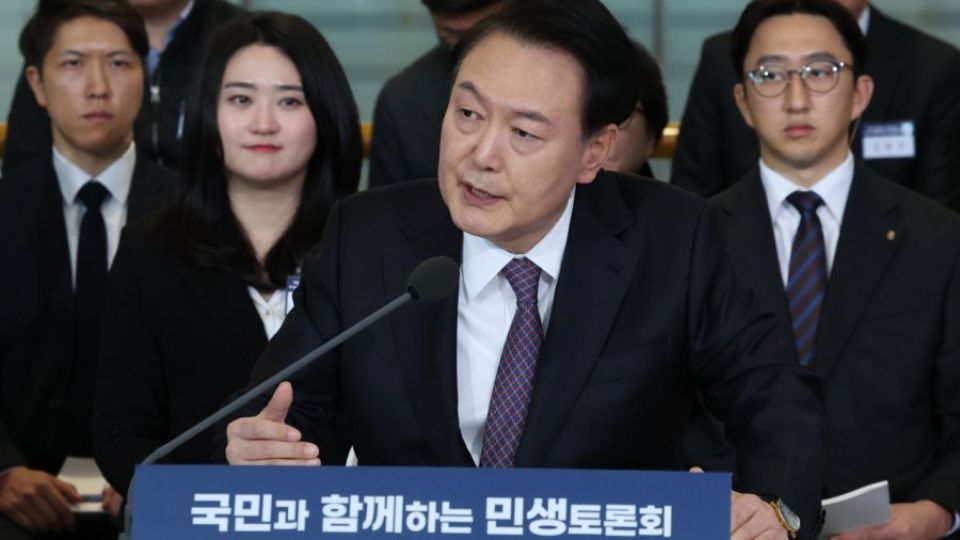January 5, 2024
SEOUL – President Yoon Suk Yeol on Thursday reiterated his pledge to support the livelihoods of South Korean citizens, including 11 trillion-won ($8.4 billion) in funding to curb consumer inflation.
Yoon’s office expressed its intention to slow inflation, as measured by the monthly consumer price index, to less than 3 percent by June.
The consumer price index in December jumped to 3.6 percent in 2023, compared with 5.1 percent in 2022.
“We anticipate the price stability with the consumer price index increase to be in between 2 percent and 3 percent,” Yoon said, as he presided over a public debate with some 230 participants — including about 130 citizens — for his New Year policy planning in Yongin, Gyeonggi Province, Thursday.
The action plan encompasses the Yoon administration’s plan to stabilize the price of agricultural goods and energy, according to the presidential office.
The government, for instance, may offer tariff exemptions and reliefs to imported goods like fruits and vegetables to tame price increases, Deputy Prime Minister and Finance Minister Choi Sang-mok told reporters Thursday.
Park Chun-sup, senior presidential secretary for economic affairs, said the budget allocation to curb consumer price volatility has increased by over 20 percent compared to that of 2023.
Yoon also expressed his hopes for economic recovery in 2024, on the back of the robust exports of goods, including semiconductor chips, and a stabilized job market.
“We aim to achieve a $700-billion milestone in the nation’s exports, attract a combined $35 billion foreign direct investments and win $57 billion of business deals overseas (through 2024),” Yoon said.
In 2023, exports reached $632.7 billion, down 7.4 percent from the previous year.
On the other hand, the foreign direct investment commitment in 2023 hit an all-time high at $32.72 billion, which includes $5.43 billion of pledges signed in the wake of Yoon’s visits to 15 foreign countries through 13 trips last year, according to the Ministry of Industry, Trade and Energy.
Alongside the plan to boost macroeconomic readings, Yoon reiterated his stance that the ban on short selling on South Korea’s stock market would continue indefinitely.
He first unveiled the plan at a Cabinet meeting in November, soon after the ban until July took into effect to achieve the capital market stabilization. He said the ban will not be lifted until the market is fully equipped with measures to stamp out “side effects” of short selling in stock price discovery, and to monitor unlawful activities in short selling attempts.
Senior Secretary Park said the electronic monitoring system will be developed swiftly, but did not elaborate on an exact timeline.
The presidential office also suggested financial relief for small retailers’ utility costs, taxes and borrowing costs, as well as policy support for regions that are already experiencing a population decline.
In particular, Yoon’s office said it would target immigration as one of the key goals to help regions suffering from shrinking populations, as the topic of depopulation was covered during the debate.
This comes as Seoul has already laid out plans to attract foreigners to tackle depopulation earlier in December, through which the government seeks to issue F-2 visas, which give visa holders a long-term residency, to those who intend to reside in a sparsely populated area so that they could get employed or found a company there.
The Justice Ministry is accepting applications from local governments willing to take part in the new visa program. Suitable candidates will be selected later in January.
Moreover, during the debate, the government proposed plans to support those in a financial pinch, by wiping loan delinquency records from an individual’s credit report and extending the deadline for corporate tax payments, according to Park.
These policy directions were suggested in the first round of such debates involving Yoon, government officials, ordinary citizens and outside experts, which the presidential office said would take the place of the usual New Year briefings by government officials.
On Wednesday, the presidential office unveiled plans to hold such public debates at least 10 times through 2024. The next one is scheduled for Wednesday.


